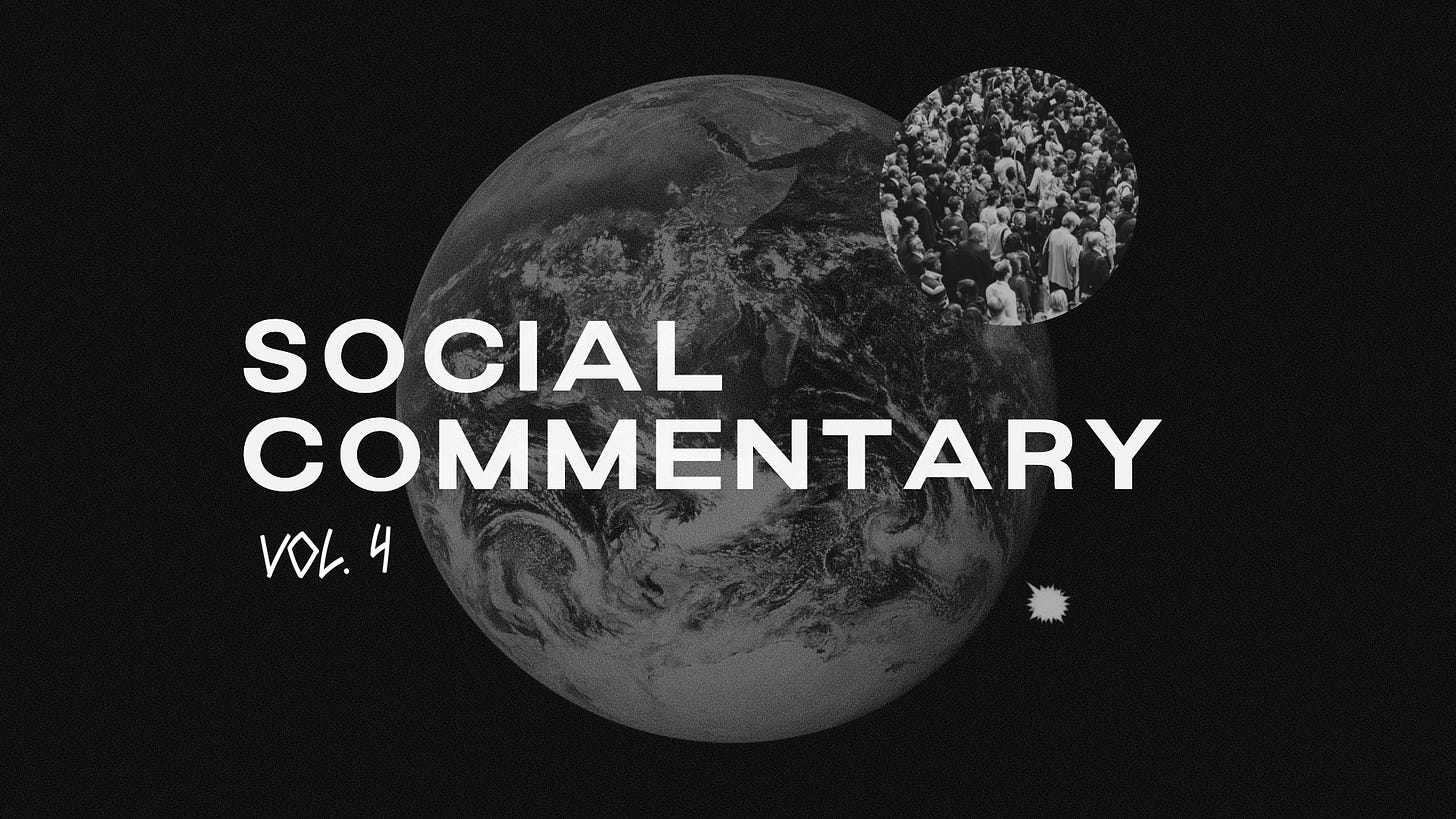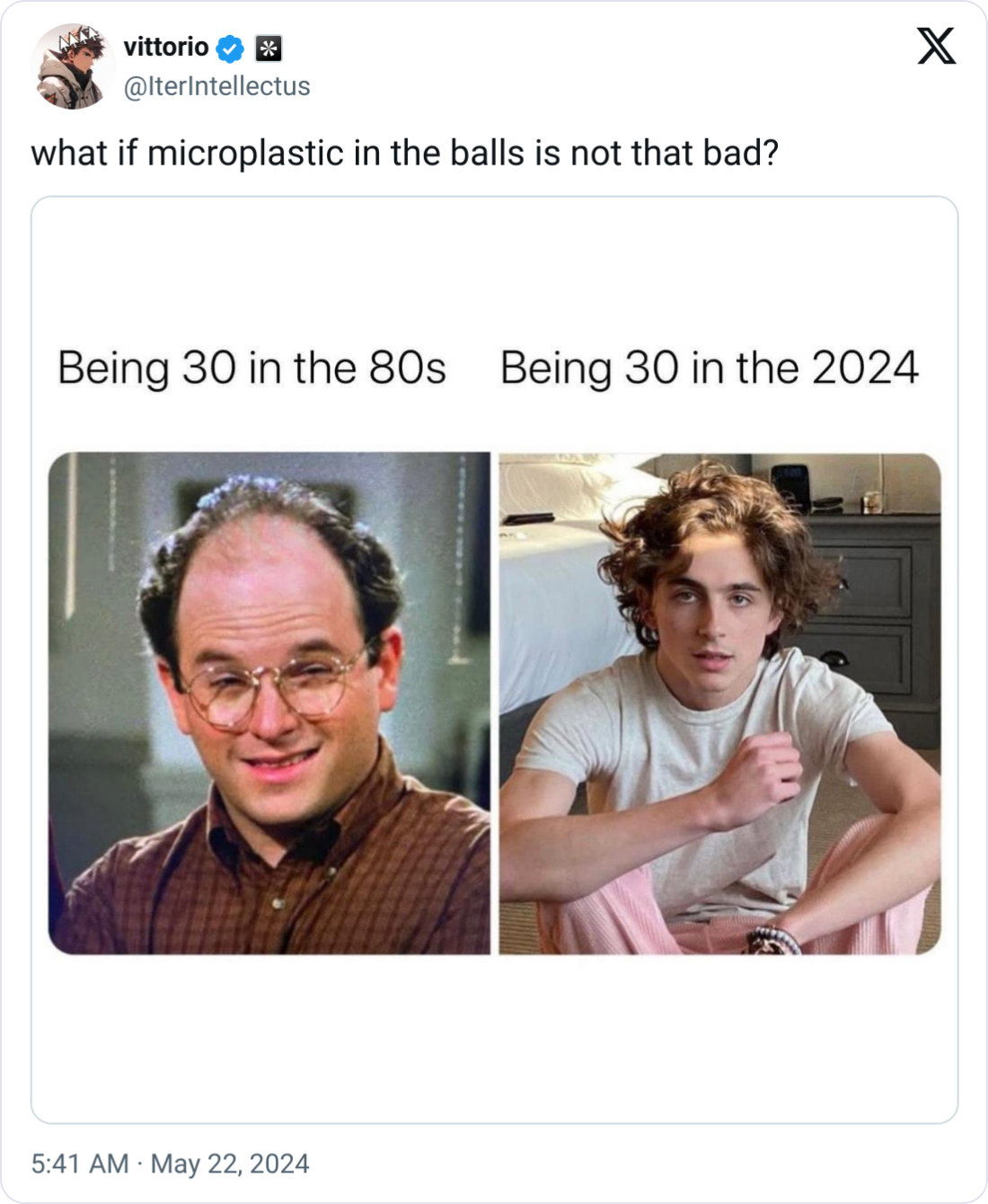SOCIAL_Commentary_Vol.4
Critical meme analyses
SOCIAL_Commentary is a reading of our memes — theorizing what they say about the zeitgeist — an expression of collective truths.
More: All Volumes
Third spaces are social locations outside of home (first space) and work (second space) that people gather to socialize casually.
In case you missed it, the widely proclaimed “death of the third space” has been attributed to our dating, loneliness and mental health crises.
With the pandemic, not only were third spaces shut down, but suddenly, our first and second spaces — home and the office — merged. Forget about the third space, we’re dealing with just a single space. For many, the internet filled in for third spaces, offering the perception of social ties... but video games don’t stand in for true friendships or eye-to-eye contact.
Because we’ve lost a sense of local community and trustworthy social cohesion, there’s been a rise in division and isolation. Or that’s the claim, at least...
We love citing “the death of the third space” today. Why? It explains a lot.
I wholeheartedly buy the thesis that we’re not gathering enough in spaces outside of home or work to kindle non-work socialization. Full stop.
However... I ask, “What exactly were those third spaces that no longer exist today?”
What’s the “death?”
Our most notable third spaces: parks, gyms, bars, libraries, coffee shops, cafes, restaurants, bowling alleys, bookstores, sporting event fields and stadiums, concert venues, movie theaters, night clubs, barbershops, and salons all still exist today.
Sure, the mall, arcade and places of worship are on the decline, but are these locations enough to be wholly responsible for the entire demise of third space social gatherings?
Meanwhile, bars have widely embraced non-alcoholic beverages (making watering holes more welcoming), workout classes and fitness chains have flourished across cities and especially the suburbs, fandom conventions are now a thing, and coffee shops have embraced Wi-Fi and laptops, allowing even longer stays.
Even accounting for the disappearance of some third spaces, arguably there’s been enough development from other spaces to make up some “death” slack. Taylor Swift sold over 4,350,000 tickets across 60 global shows for her Eras Tour. Social gathering on that scale and consistency has never existed before in history.
So...
I don’t know how much of our problem is the lack of third spaces as much as it is our lack of willingness to put ourselves out there to meet people in those third spaces.
The “demise of dating” story is a similar blame game. Is it “the apps” or is it our shrinking willingness to experience discomfort, bad conversation and the potential rejection? A scarcity of social etiquette is what’s truly at fault. Let’s not blame “an app” for an atrophy of respect.
Social infrastructure, whether that be dating apps or libraries, requires our investment and innovation. We can do more.
But it’s unreasonable to expect loneliness or dating to be solved without our participation and willingness to do better ourselves.
Often our thoughts around uniqueness, diversity or variability are, ironically, quite predictable, homogenous and trite.
True anti-memetic thought and behavior is incredibly difficult to come by. Some ideas don’t want to spread.
If memes refer to the transference of ideas (ex. styles, languages, religions), and get passed on like genes or mutate like viruses, then anti-memes don’t want to travel, be remembered, or change.
Coming across anti-memes, let alone participating in them (like traveling anywhere on the map above not circled) is importantly noteworthy.
Too often we’re studying memes, when we should be honoring anti-memes.
I debate myself (very frequently) what things are not worth being anxious about.
It’s much easier (and trendier) to panic vs. productively overlook the existential flavor of the month.
Micro-plastics is one such topic.
The more I think about this one, the more powerless I feel. What can I possibly do about the micro-plastics floating around inside me? According to the medical community, it’s physically impossible for a body to dispose of these plastics. Therefore:
“Does worrying about this feel helpful?”
Before getting in a tizzy... We can ask these questions, and still be aware of what’s happening around us and work to ensure change occurs.
In other words, being chill about microplastics does not insinuate “head in the sand privilege.”
A related question we can ask is: “Is it any of my business?”
This is a profound question.
Not only is it worth asking this question to maintain our sanity, it’s worth reflecting on why we increasingly feel compelled to answer “yes.”
It’s a radical approach, but from where I stand, I can’t do anything about these bits of plastic. “F it” as coping.






